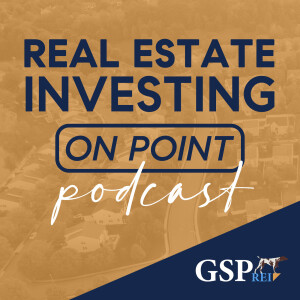
Wednesday Dec 06, 2023
E08: Exploring the Supply and Demand Dynamics in the Housing Market
Curious about rising interest rates, supply and demand, and the impact of institutional investors? Tune into this latest episode for a deep dive into the real estate investing industry as GSP REI partners Peter, Ron, and Wade discuss trends shaping the market, factors like interest rates, supply and demand, and the impact of large institutional investors on the housing market. They also provide an update on Wade's HUD property due diligence for an upcoming auction – plus, their Thanksgiving holidays and Christmas shopping plans!
Here are some power takeaways from today’s conversation:
- Their Thanksgiving celebration and holiday plans
- Wade’s strategy for upcoming HUD property auction
- The pandemic’s impact on the housing market
- The impact of interest rates on the real estate market
Episode Highlights:
[15:49] Wade Shares Strategy for Upcoming HUD Property Auction
Wade provides an update on his HUD property due diligence for an upcoming auction, detailing that they submitted their preliminary model that morning after diligencing around 1200 of the 1500 total loans being auctioned. He discusses their strategy of bidding on most Florida assets despite it typically being very competitive, with plans to bid on around 300 to 350 properties in that state. Wade also notes some markets they will avoid bidding on and that he will make some additional edits to their model over the weekend before submitting final bids.
[24:11] The Pandemic’s Effect on the Housing Market: Wall Street Investors vs. Homebuyers
- The intense competition between homebuyers and Wall Street investors in the housing market has resulted in unprecedented price surges. Homebuyers, with their longer time horizons, are willing to pay more for properties. However, there comes a point where further price increases become unprofitable for Wall Street and investors. Notably, Wall Street's focus has been on specific markets, including Atlanta, North Carolina, and Texas, with around 35% of purchases concentrated in just 11 zip codes. It is important to note that data may not accurately reflect homeownership rates as it may not account for all adults living in the homes. There’s also a rising popularity of builder rank communities, which offer lower-priced homes that attract first-time buyers. Ultimately, the primary factor driving high prices is the significant shortage of available housing supply.
[30:11] A New Default Cycle in Corporate Debt Sparks Questions about the Fed's Actions
Amid the headline of a new default cycle in corporate debt, concerns about the Federal Reserve's actions come to the forefront. Speculations arise regarding whether they waited too long or did too much in a short period of time, potentially resulting in an overcorrection due to the lag effect. Driving up rates rapidly doesn't yield immediate effects, and although recent data shows a shift in the opposite direction, the full extent remains uncertain. Additionally, economists warn that the repercussions of rate hikes may not be fully realized until six to twelve months later than anticipated, possibly burdening the economy more than expected. Notably, corporate bankruptcies have increased, signifying the impact of the interest rate environment on businesses. The consequences of these developments are poised to reverberate throughout the economy, influencing job markets and labor dynamics.
Resources Mentioned:
No comments yet. Be the first to say something!